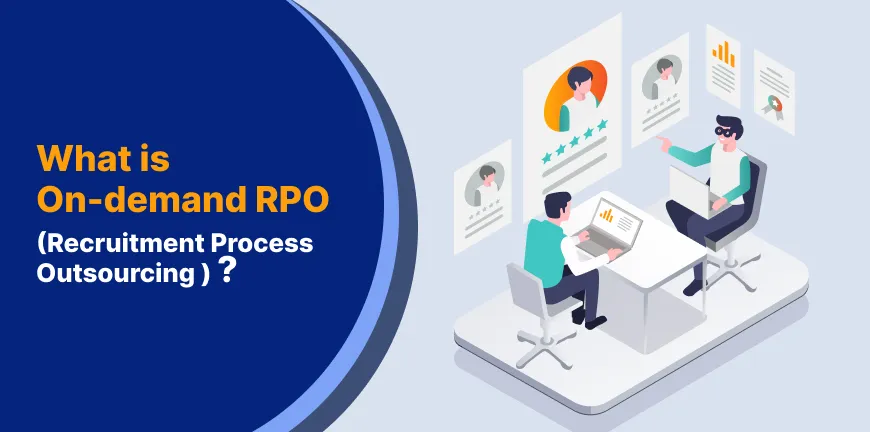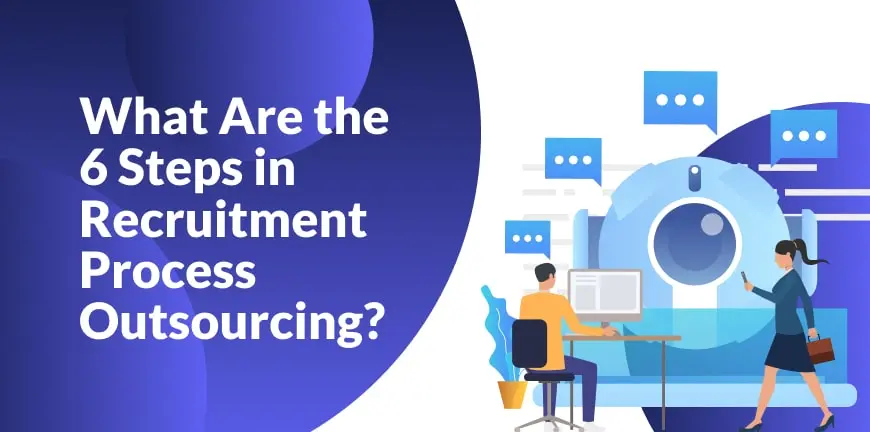
What is an End-to-End Recruitment Process?
28/10/2025
What is Workplace Ethics? Definition, Importance, Examples
03/11/2025- What is RPO in recruitment?
- How Does RPO Work?
- What are the Types of RPO Models?
- What are the Key Benefits of RPO Recruitment?
- What is the Difference Between RPO and Traditional Recruitment?
- What is the Step-by-Step RPO Process Flow?
- What are the Challenges in RPO Recruitment?
- Why Companies in India Choose RPO Recruitment?
- What are the Future Trends in RPO Recruitment?
- Conclusion
- FAQs- Frequently Asked Questions
Recruitment Process Outsourcing (RPO) recruitment is a strategy that allows organizations to hire skilled individuals to address their business or workforce needs, without worrying about handling the tedious recruitment process. How? In this process, companies, depending on their own recruitment capabilities or needs, transfer the responsibility for managing part or all of the recruitment process to an expert third-party specialist. This allows organizations to use their resources mindfully, meaning they are neither overused nor underused.
What is RPO in recruitment?
Recruitment process outsourcing, or RPO, is the outsourcing of recruitment responsibilities to an expert third-party organization to hire skilled talent and address a company’s talent needs. Startups, mid-sized companies, and large corporations can outsource their hiring needs to an expert third-party provider to hire quickly, access skilled talent, save resources, and scale their workforce easily.
How Does RPO Work?
A third-party recruitment process outsourcing company takes care of all aspects of the recruitment process except the hiring decision. A good Recruitment Process Outsourcing company like Alp Consulting engages in the best practice processes, tools, and technology required to attract the right talent and assess and hire them to drive business success. Professional RPO partners build on the goals and expectations of the client’s business, thereby creating a comprehensive model that transforms their recruitment activities into a competitive advantage.
What are the Types of RPO Models?
RPO models of various types. They are designed keeping in mind the distinct workforce needs of businesses.
1. End-to-End RPO
In this RPO model, all recruitment processes and other talent acquisition strategies will be handled by the RPO provider. This is a long-term engagement model that can cover services like candidate attraction, candidate screening, candidate assessment, interview, onboarding, or compliance monitoring. If you have continuous hiring needs, then this model is right for your company.
2. Project RPO
This RPO recruitment model will cover all the processes involved in the end-to-end RPO model, but on a short-term basis. This model is often used when companies need talent as part of a specific project. The agreement will only be for the tenure of the particular project. You can also make use of this model to test or check if engaging RPO services is suitable for the long-term goals of your company.
3. Selective RPO
In this model, you can choose to outsource only certain recruitment functions as per your company’s requirements. Specific functions that the internal team may not be adept at, like candidate sourcing, applicant screening, candidate management, or recruitment marketing, can be taken care of by them. RPO providers can give your employee branding and recruitment marketing strategies a facelift.
4. Recruiter on Demand
This flexible RPO staffing model can be used for projects with short timelines. You can easily tackle hiring spikes or rapid changes within the organization with this model. The RPO provider can customize a flexible hiring strategy that suits your fluctuating recruitment demands. With this model, you can have immediate access to the talent resources of a recruiter who is familiar with your company processes.
5. Contingent Recruiter on Demand
When there is an urgency to fill some positions, you can use this model to supplement the efforts of your in-house team. This is so hiring can happen fast, and the RPO provider needs to be paid a fee only if a candidate has been successfully hired. This engagement model is quite fast-paced, and hence detailed screening process may not be done like in other RPO models.
What are the Key Benefits of RPO Recruitment?
1. Enhanced efficiency and expertise
With RPO models, organizations get a dedicated recruitment specialist with the capabilities to recruit talent as per their business needs. Reasons why partnering with an expert RPO agency is enhanced efficiency include the rich knowledge and expertise the RPO experts possess to recruit skilled talent, use of the right technology to filter and hire the best.
2. Cost-effectiveness
When companies outsource their recruitment needs, they don’t have to have a dedicated recruitment team in-house. This automatically reduces the overhead costs that come with hiring in-house teams. And given the expertise of RPO recruitment, there are fewer to no chances of making bad hires, which saves costs in the long run.
3. Scalability
Companies can scale their workforce up or down based on their fluctuating business needs. With RPO partners, they can easily hire skilled candidates when required, as well as halt the hiring when needed. This is useful for organizations when they are either looking to ramp up their workforce during seasonal needs or when they are expanding to new outlets or want to halt their recruitment during slow seasons.
4. Access to a huge talent pool and better-quality hires
RPO partners with experience in the industry, has vast networks and talent pools, giving access to a wide range of qualified candidates. This helps organizations fill positions that are hard to fill due to the niche skills they require.
5. Enhanced employer brand
RPO recruitment is a well-thought-out process that ensures not just the employer but also the candidate benefits and has a good experience. When candidates are happy with a company’s hiring process, they are more likely to share that experience with others and become brand advocates. RPO partners even help companies to showcase their brand in a better light by modifying the career website, keeping you active on social media by sharing your brand’s culture, employee experiences, etc.
6. Time and resource optimization
Since RPO partners have vast networks and talent pools, and recruitment capabilities, they take a lot less time to fill open positions in an organization. And filling vacant positions quickly can help reduce costs because time is money. This also helps organizations maintain their operational speed and accuracy. Outsourcing recruitment needs allows HR teams to focus on better initiatives like employee development programs, retention strategies, etc, allowing better resource optimization.
7. Compliance and risk management
The right RPO providers make sure to stay on top of changing employment laws and regulations. This ensures organisations meet the compliance requirements related to the hiring process. As experts in the field of recruitment, RPO partners make sure to conduct the necessary background checks, etc, to eliminate any risks associated with hiring.
8. Data-driven insights
RPO solutions from the right provider include reporting and analytics capabilities that provide companies with insights to help them make better decisions. It also highlights areas that can be improved and gives an overview of the ROI of recruitment initiatives.
What is the Difference Between RPO and Traditional Recruitment?
| Factor | RPO (Recruitment Process Outsourcing) | Traditional Recruitment |
| Scope of Service | Comprehensive and end-to-end—covering sourcing, assessments, interviews, onboarding, reporting, and employer branding . | Limited or transactional—focused mainly on sourcing and shortlisting candidates for specific positions . |
| Ownership and Responsibility | RPO providers take full accountability for recruitment results and performance metrics (time-to-hire, quality of hire, retention) . | Recruitment agencies or internal HR teams handle only parts of hiring without direct responsibility for long-term outcomes . |
| Approach and Strategy | Proactive and consultative—RPO partners align hiring with business goals, use data analytics, and continuously refine hiring strategies . | Reactive and short-term—focused on filling vacancies as they arise, often without deep process analysis . |
| Technology and Tools | Uses advanced tools like AI sourcing, ATS (Applicant Tracking Systems), and analytics dashboards for efficiency and insights . | Relies primarily on manual processes or basic job boards for candidate sourcing . |
| Cost Model | Predictable flat or subscription-based fees covering all recruitment-related activities, offering long-term cost savings . | Charges per hire or based on a percentage of the candidate’s first-year salary, often resulting in higher per-placement costs . |
| Relationship with Employer | Strategic partnership—RPO acts as an extension of the business, aligning culturally and operationally . | Vendor-client relationship—agency support ends after placement, with limited process integration . |
| Scalability and Flexibility | Highly scalable—RPO adjusts seamlessly to hiring surges or downturns, offering partial or full outsourcing models . | Less scalable—requires manual adjustments and new agreements for expanded hiring projects . |
What is the Step-by-Step RPO Process Flow?
The typical, yet effective RPO process includes six steps-
1. Understand hiring needs and form a strategy
A good RPO company generally starts by assessing the hiring needs of your organization. This includes the number of candidates you require, the urgency to fill the open positions, priority-wise, your organization’s culture and values, etc. Based on this information, they come up with a hiring strategy.
2. Optimization of hiring strategies
Whatever your existing process is, clearly, there are some things that need to be changed. And that’s what an RPO partner does. Revision of job descriptions, exploring talent pools to attract potential candidates, assessing and modifying your company’s branding, and using social media to highlight the best things about your brand are some things an RPO partner would do.
3. Screen for talent
Matching skills and qualifications mentioned in resumes with relevant role requirements, conducting initial interviews through phone, skills assessment tests, background verification, etc, are all done to evaluate talent. To do this effectively, they use recruitment technology, which helps streamline the process. Candidates are shortlisted after all these and are set up for final interviews.
4. Assist with finalising the candidate
To help companies select the perfect candidate who is best for the role as well as their organization, RPO partners offer proper recommendations by measuring candidates against your company’s values, culture, and job requirements. They also help craft interview questions and implement skill assessments to help choose the best.
5. Offer onboarding support
RPO partners help in communicating the employment offer and handling the negotiation process. They also take care of the subsequent administration needs once the candidate accepts the offer, which typically includes collecting essential candidate documentation.
6. Track metrics and modify your hiring process
Recruitment metrics like cost-per-hire and time-to-hire are tracked and analyzed. A top-tier RPO provider is transparent about its process and whether it’s helping your organization meet its goals. They’ll also work with you to identify areas that could still use improvement so you can optimize your recruitment process.
What are the Challenges in RPO Recruitment?
The biggest challenges in implementing RPO include
- losing control over recruitment processes
- system integration issues
- compliance risks
- cultural misalignment.
Companies also face difficulties managing costs, ensuring hiring quality, and overcoming internal resistance to change.
Why Companies in India Choose RPO Recruitment?
- RPO provides assess and help improve a company’s turnover rates, technology, scalability, analytics, and performance management
- Introduce and equip your organization’s recruitment processes with the right technologyrequired to power these processes
- Extensive job marketing through various networks to ensure candidate exposure to jobs and the employer’s brand
- Build employer brand and recognition, and engage future potential talent through talent pipelines
- Ensure thorough candidate assessments and manage their job-seeking experience, whether they are being interviewed,hired, or considered for the job
What are the Future Trends in RPO Recruitment?
1. AI integration and Machine Learning for effective hiring
AI integrations empower personalized candidate engagement, automate communication, offer data-driven insights, and predict ideal candidates, all while prioritizing data security and compliance.
2. Recruitment Websites can Attract Potential Candidates
Clear job listings, a good ranking on Google for the website, and a professional-looking website are key factors that attract potential candidates.
3. Remote and hybrid work is here to stay
More and more companies are adopting remote and hybrid work models, and these have become a new standard across many industries.
4. Focus on skill-based hiring
Companies can use tests, real-life tasks, or project-based interviews to assess the skills of candidates.
5. Gig Economy to the Rescue
Companies have been increasingly seeking to hire freelance talent to support their various short-term and long-term projects.
6. Personal branding can attract potential candidates
What attracts a candidate to your brand is how you show it. If you can make sure that your brand is so attractive and it tells candidates everything they want to know and are looking for, then you can win in the talent war.
7. Diversity, Equity, and Inclusion must be prioritized.
It’s high time that companies realise that having employees from diverse backgrounds and unique experiences is what they need to ensure innovation and creativity don’t come to a standstill.
8. Pay transparency
It is a move that can narrow the gender pay gap and provide better clarity in the job market, making those potential candidates appreciate your transparency.
Conclusion
RPO recruitment services include comprehensive support throughout the entire hiring process. From providing salary and talent availability guidance to ensuring compliant employment practices across different countries, an RPO team becomes an extension of your own.
FAQs- Frequently Asked Questions
1. What does RPO mean in recruitment?
Recruitment process outsourcing (RPO) is a workforce solution in which a business transfers all or part of its permanent recruitment to an external provider.
2. What is the main purpose of RPO recruitment?
The main purpose of Recruitment Process Outsourcing (RPO) is to help companies improve their hiring results by transferring some or all recruitment functions to a specialized external provider.
3. How is RPO different from traditional recruitment?
RPO and a traditional staffing arrangement differ in terms of scope, engagement and level of service. The biggest difference between RPOs and traditional recruitment is scalability and capacity building.
4. Is RPO suitable for small businesses?
Yes, RPO offers scalability and flexibility to companies of all sizes and allows them to use RPO services as per their business needs.
5. What are the advantages of RPO recruitment?
The advantages of RPO recruitment include cost savings by reducing internal overhead, scalability to adapt to changing hiring needs, and improved quality of hires through access to specialized expertise and technology.

Amit Saproo
Amit Saproo is the Head of Operations at ALP Consulting with nearly 17 years of experience in Executive Search, RPO, Leadership, and IT & Engineering recruitment. He leads nationwide recruitment programs across Technology, BFSI, and R&D domains, driving strategic hiring solutions for diverse client needs. Amit excels in building and managing high-performance teams that deliver scalable, end-to-end recruitment and consulting services.




